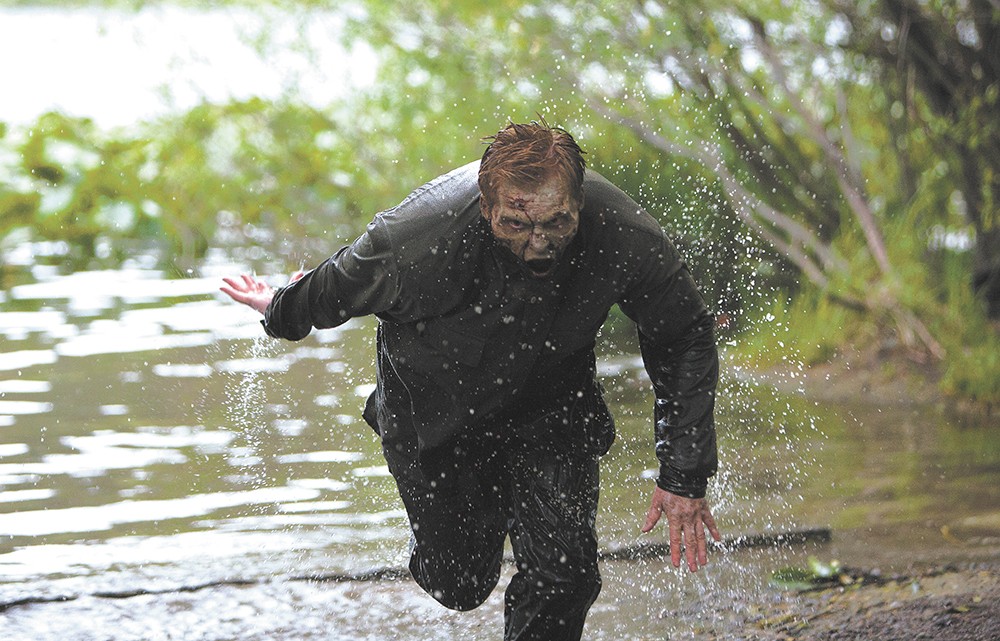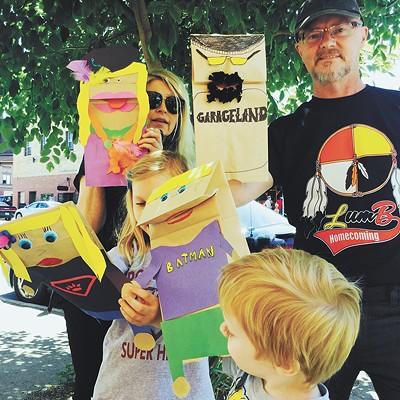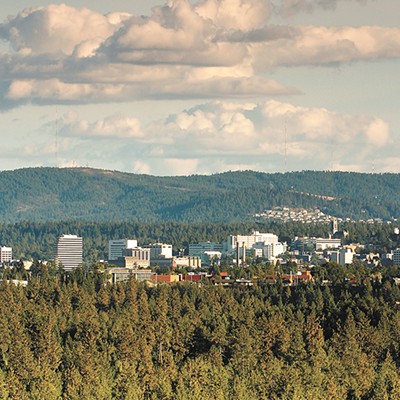On a sweltering, late-August afternoon, a group of gun-toting men and women, clad in flashy garb ranging from military-style getups to tattered overalls, gather under the Monroe Street Bridge. There, on this day, resides a makeshift shelter from the zombie apocalypse, where humanity's heroes have assembled to hatch their species-saving plan. Tomorrow, the place will return to its usual form: a popular stretch of Spokane scenery.
That's because, in reality, those on-site are shooting a scene for the third season of Syfy's corny-but-enjoyable, Spokane-filmed cable television series Z Nation, which premieres on Friday. Previous hurdles faced by Z Nation's ragtag group of survivors led them on cross-country expeditions, but the narrative this season is set largely in Spokane. Near the season's start, zombie-virus-immune antihero Murphy recalls a memory of visiting the city for the World's Fair, and decides to set up shop rebuilding humanity in the remnants of the city due to its plentiful water and power.
Though Z Nation's plot is only now settling down in the Lilac City, the show has been here all along from a production perspective. While Z Nation was still in its early stages of development, The Asylum, the L.A.-based company officially responsible for the show's production, was advised to check out Spokane and its accompanying production company, North by Northwest. Rich Cowan, North by Northwest partner and co-founder, offered up an appealing episodic budget, and the city became Z Nation's permanent home.
"They needed great locations, they needed infrastructure, they needed people that they could employ, and so we just set all that up for them," Cowan recounts.
Most of the crew now hard at work on Z Nation's third season is comprised of the same Spokane-based freelancers who work on any typical North by Northwest project, like one of the company's film productions. Cowan says that the show provides around 200 cast and crewmembers with unionized, family-wage jobs that include pensions and health care, and for longer sustained periods than any feature film can.
Rooms at North by Northwest's Broadway headquarters are packed with staff hard at work on various aspects of Z Nation's production: sound mixers, color correctionists and editors go about their duties. In the basement you'll often find the show's second unit director, Juan Mas, a 20-year resident of Spokane. Previous lulls in the city's filmmaking scene forced Mas to seek work as far away as eastern Europe, but Z Nation's presence has allowed him to stay in his hometown for three consecutive years. Along with a few other Spokane natives, he has been allowed to direct episodes of the show's second and third seasons. Mas views this as an honor, and also voices appreciation that interns invited from EWU get nitty-gritty tastes of the industry outside of their film theory classes.
Spokane's many benefits as a film location could foreshadow the expansion of such opportunities for local denizens in the near future.
"We've been able to find nearly every possible geographic look here," says Z Nation executive producer Jodi Binstock. "We've been able to really make everything."
The show has filmed on the Palouse, at Eastern State Hospital and Riverfront Park, and even in alleyways in the heart of downtown. Crewmembers have converted Spokane's various locales and biomes into wildly varying locations like the Grand Canyon and Pennsylvania Amish country.
When it comes to attracting filmmakers, geographic diversity isn't the only thing Spokane has going for it; the city also boasts an accessible airport, manageable traffic and parking, architectural diversity, first-class hotels and restaurants, and enthusiastic residents and municipal governments more than willing to accommodate the show's filming. Cowan cites all these as factors that lower costs for production companies while boosting efficiency and morale for crews. Now that Z Nation's positive experience has let the cat out of the bag, he believes that companies will be more inclined than ever to base projects in Spokane.
"About the biggest no-brainer I can think of is expanding this industry in Spokane," Cowan says. He sees the city's filmmaking industry as one that could very well employ a workforce of 500 people, translating to two full production crews at any given time. "You're looking at a back lot there," he says, gesturing out the window of his second-story office to Spokane's downtown cityscape.
Cowan thinks that an expanded filmmaking industry could provide a significant economic boost for the city — but the plan is heavily reliant on a tax incentive for in-state filmmakers, funded by the state legislature and allocated by Washington Filmworks, that will soon require a renewal to stay in effect. Z Nation takes advantage of that incentive, as does just about every large-scale project that films in the area.
According to Cowan, North by Northwest plans to make a compelling argument for the incentive's renewal. So long as the incentive remains, the local expansion of the industry is an exciting inevitability, as far as he sees it. "It will absolutely happen..." Cowan trails off. "Unless there's a zombie apocalypse." ♦





















